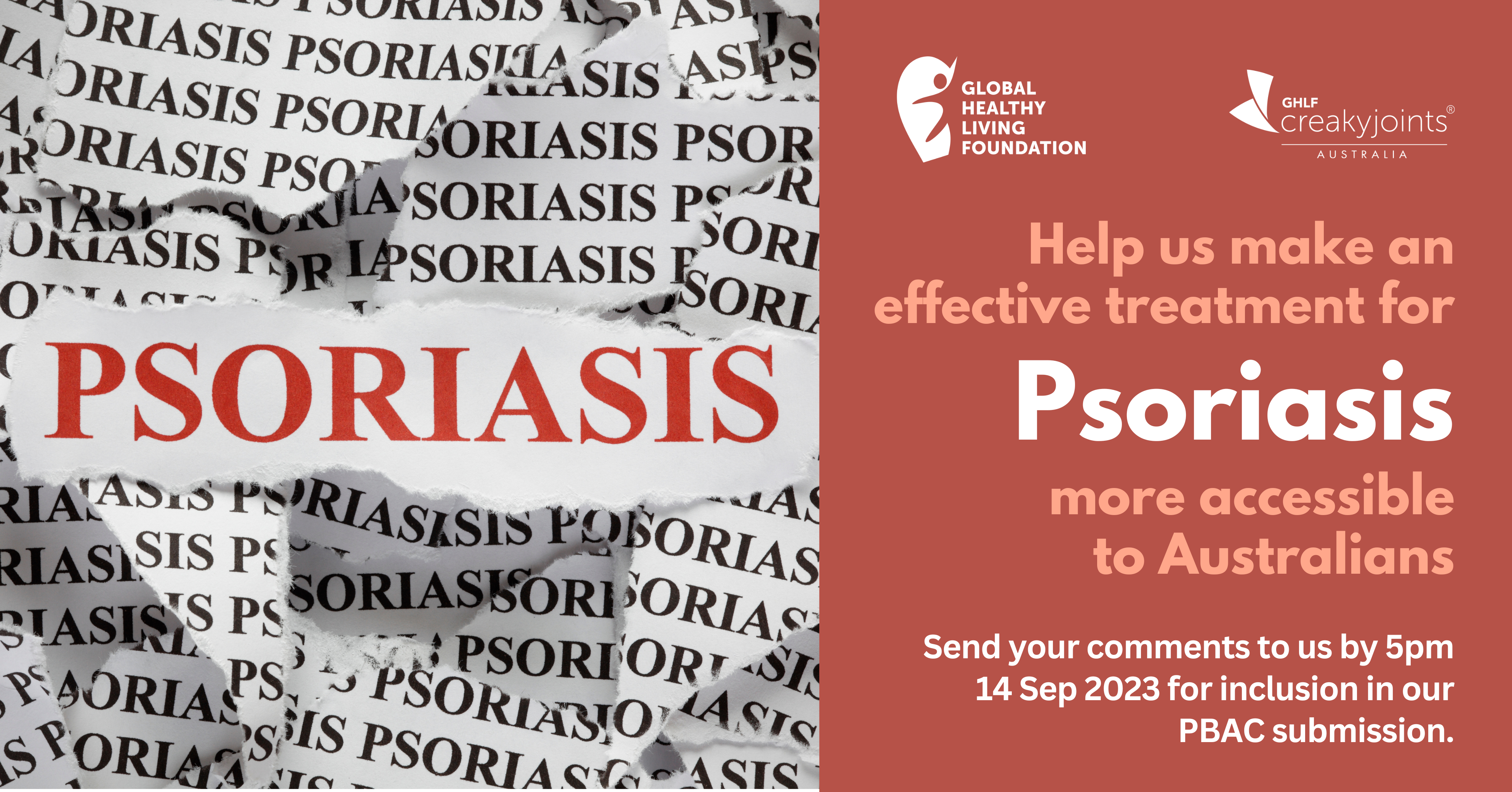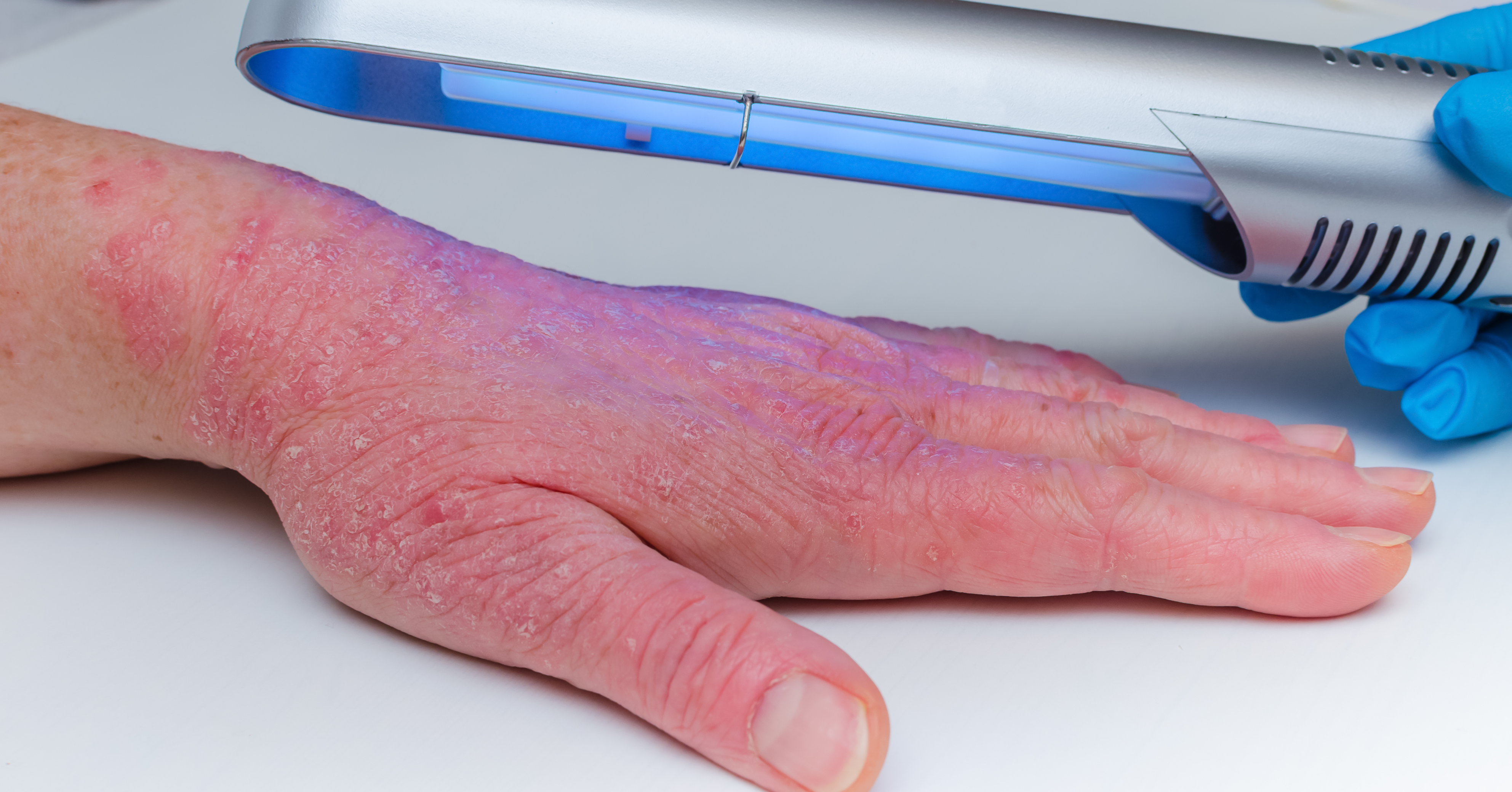Two new breakthrough treatments brings fresh possibilities for those living with chronic plaque psoriasis.... Read more >

Empowering the mind: Effective strategies to enhance mental health for people with psoriasis
Empowering the mind: Effective strategies to enhance mental health for people with psoriasis
Living with a chronic inflammatory disease like psoriasis means taking care of your mental health. Here’s what to know about monitoring mental health issues in psoriasis and how to incorporate mental health treatment into your overall psoriasis management.
Published 14 June 2023

Psoriasis (PsO) is a chronic autoimmune skin condition that affects millions of people worldwide. While the physical symptoms of psoriasis are well-known, the condition can also have a significant impact on mental health. Many people with psoriasis experience anxiety, depression and social isolation due to the visible and often stigmatised nature of the disease.
In this article, we will explore the relationship between psoriasis and mental health and share things you can do to look after your mental health.
The link between psoriasis and mental health
Whether you have psoriasis or another chronic condition, here’s essential advice to live by: You need to treat emotional and mental health symptoms as seriously as physical symptoms.
Poor mental health not only interferes with daily living, but it can cause your psoriasis to flare, increase pain and fatigue, impact your work and relationships and limit your ability to take your medications properly and manage your overall health.
Many autoimmune conditions (such as type 1 diabetes or rheumatoid arthritis) don’t have obvious visible symptoms. This can be both a blessing and a curse. On one hand, people with an invisible condition can usually pick and choose when to discuss it with others. On the other hand, they might find others don’t believe them when they describe the symptoms they experience. Those who live with psoriasis, though, often find their symptoms can be difficult to hide as they can occur anywhere on the body.
The exact cause of psoriasis is not known, though genetics plays a key role. Several factors are known to trigger the development of psoriasis, including:
- Prolonged stress or trauma
- Injury to the skin
- Infections, such as streptococcal tonsillitis or HIV
- Certain medications, such as lithium
When we experience stress, our body goes into a heightened state of awareness while it tries to work out if there is danger around. When stress is prolonged, the body stays in that “fight or flight” mode and remains tense. This changes our balance of hormones and can make us more likely to develop health problems such as psoriasis or other autoimmune diseases.
The reverse is also true. The pain, itchiness and other symptoms of psoriasis can also have a significant impact on a person’s mental health. A 2017 study published in the Indian Dermatology Online Journal looked at the effects of psoriasis on the quality of life, self-esteem and body image. This study found that 54 per cent of respondents experienced a level of stress and anxiety that surpassed the general average.
A Danish study, published in JAMA Dermatology, tracked around 13,700 patients with psoriasis between 1977 and 2013. These patients were 75 per cent more likely to develop a mental health condition than the general population, and 72 per cent more likely to have depression. Around 5 per cent of the cohort had a mental disorder within 10 years of receiving a psoriasis diagnosis.
Factors that can affect mental health in people with psoriasis
The following is a list of some of the factors that may cause people with psoriasis some distress. However, it’s important to note that you may not experience all of these or they may only affect you at different points in time.
Pre diagnosis
As symptoms appear, not knowing what’s happening to your body or why can be scary, especially if your symptoms are uncomfortable. Delays to diagnosis can not only lead to worsening symptoms but can also increase your stress and anxiety levels.
Diagnosis
Receiving a psoriasis diagnosis can be a huge relief when you finally have a name for what’s happening to you. However, it can also be a shock to learn you have a lifelong condition. The uncertainty around disease progression and what your future might look like can also be frightening.
Symptoms
Dealing with psoriasis symptoms, such as cracked skin or damaged nails can negatively impact your mood. If you also live with comorbid conditions such as psoriatic arthritis, it can be difficult to work out which condition is causing your symptoms and that can be very frustrating.
“Flaking dead skin was a problem for me for a long time. There was nothing I could do about it except to avoid scratching when I was around others. It was so annoying. Thankfully, my skin is much clearer these days.” — Rob C
Another common symptom is fatigue. The mental symptoms of fatigue can be just as debilitating as the physical ones. (See the previous article in this series, Top tips for managing the fatigue that comes with psoriasis, for more information about fatigue symptoms.)
Treatments
Psoriasis treatments have come along way in recent decades and it is now possible for people to get back to very low levels of disease activity. However, you may sometimes experience potential side effects, including temporary discomforts like nausea or mild cognitive effects. Some people also need tar-based topical treatments which often have a distinct odour and a greasy texture, so they can impact self-esteem to an extent.
Unfortunately, some treatments may not work (or not work well enough) for you but going through a trial-and-error process can be disappointing and frustrating. Even if your medications seem to be working, and you’ve been under good control or in remission for some time, you can start experiencing flares and pain that indicate you may need a change in medication for better control.
Social and emotional impacts
The unpredictable nature of psoriasis can certainly cause anxiety and make planning daily activities difficult. Similarly, you might worry that people will see you as being unreliable if you don’t get your work done on time. Or you might feel guilty or embarrassed for relying on people around you or not being there to support them.
For many, the stigma they feel when others see their psoriasis erodes their self-esteem and is one of the hardest things to deal with.
“Going to the hairdresser can be quite embarrassing,” says Karen Ridsdale, president of Psoriasis Australia. “Some salons are aware that we have scalp psoriasis and are ok with it. But there is a lot of discrimination and stigma if you’ve got a severe flare of scalp psoriasis. You can’t catch psoriasis. It is an autoimmune skin condition.”
Psoriasis can affect relationships with partners as well. “You end up with skin and blood on the sheets when you wake up in the morning because you’ve scratched yourself in your sleep. It’s very embarrassing,” says Karen. Similarly, dealing with the health system or the costs of treatment can put the whole household under stress.
Other emotions people with psoriasis often feel include:
- Grief from mourning for the life they led before developing psoriasis.
- Sadness from being rejected or mocked by others (such as being told they are just “lazy”).
- Uselessness or anger at themselves and their bodies for not being able to do the things they want to do.
- Irritability or moodiness (often compounded by poor sleep).
- Loneliness from being isolated at home or not being supported by those around them.
“We all put on a brave face. When we’re on our own we wish we’d wake up one day and it wasn’t there or it wasn’t as bad,” says Karen.
The importance of treating depression and anxiety
No formula can predict which psoriasis patients will develop depression or anxiety. Many factors — including your biology, coping mechanisms and level of distress — can affect your mental health.
Only a fraction of people with depression and anxiety get treatment, however. A big part of that may be due to patients’ reluctance to take medication or to add therapy to a schedule that’s already challenging to maintain along with psoriasis symptoms like pain and fatigue.
All of that is very understandable, but what’s most critical is that you don’t try to make these decisions on your own. People with depression and anxiety may experience brain changes that make them less aware of just how much they’re debilitated by their symptoms, which makes outside perspective and advice all the more important. And remember that just because you start medication or therapy for a mental health condition doesn’t mean you’ll need to stay with it indefinitely.
Starting the conversation
Sometimes it may seem like there’s no time to discuss your mental health in a medical appointment. However, if your doctor doesn’t ask about your mental health — and you’re concerned that you might be experiencing signs of depression or anxiety — bring it up yourself.
Your doctor needs to know how you feel to properly treat you and to discern if your concerns are normal or if they really should be treated. They need to have a full picture of who you are, not just your joint counts, blood test results and range of motion.
At your next GP or specialist visit, try one of the following conversation starters to spark a dialogue about your mental health:
- Can we talk about my mental health during this visit?
- I’m having trouble sleeping and I can’t focus — are these signs of anxiety?
- I’m feeling a little down lately and have no interest in things — how do I know if I’m depressed?
- What diet or lifestyle modifications can I try to minimise depression/anxiety?
- Are there any medications or treatments that will help my depression/anxiety?
- Do you think I’d benefit from talking to a mental health professional?
Seeking support from others
There’s no shame in seeking mental health support. It’s no different to seeing a doctor or physiotherapist for your physical health and it allows you to receive care on a more holistic level.
The benefits include:
- Reduced stress and anxiety
- Improved coping skills, including strategies for improved sleep habits
- Increased self-esteem
- Better adherence to treatment
- Improved relationships
- Greater sense of control
Many of these goals can be achieved by using talking therapies, such as cognitive behavioural therapy (CBT). However, you might also benefit from using anti-anxiety or antidepressant medication. The right medication for you depends on the severity of your condition and whether you have other health problems or take other medications.
Your GP can refer you to a psychologist, psychiatrist, counsellor or another allied mental health professional via a GP Mental Health Treatment Plan. In most cases, Medicare benefits are available for up to 10 appointments per patient per calendar year. The Beyond Blue website has information on what different mental health professionals do and how to find mental health services near you.
Jo Mohan has lived with psoriasis and related conditions for over 40 years. “While others will never fully understand, talking to someone about what psoriasis feels like for you is very important,” she said. “Seeing a counsellor and talking to her about my illnesses and my need to meet people’s expectations was one of the best things I ever did.”
Jo also started the Psoriasis and Psoriatic Arthritis in Australia Facebook group because she felt as though no one around her understood what she was going through and she felt very lonely. “I set up the group in case another person was sitting at home wondering if there was anyone else out there feeling like this. If they saw my page, they’d see that there was at least one other person out there feeling the same way,” she said.
Self-care for mental health
Learning strategies to cope with stress empowers you to rely less on outside forces for your wellbeing and improve your attitude, which is also important to help you heal.
Adrian Comensoli is a registered psychologist based in Wollongong, Australia. Here are his tips for proactively managing your stress and improving your mental health.
- Listen to your body. Know your signs of too much stress. For example, not exercising or eating well, having difficulty concentrating or experiencing mood swings or a sense of losing control.
- Accept your stress for what it is. Remind yourself that living with a chronic condition means you will have good and bad days so try not to feel bad about what you “should” be doing.
- Rate your stress levels. Adrian suggests using a scale of one to 10 or traffic light colours.
- Have different strategies ready for different levels of stress.
- Limit or amend your activities in times of high stress. Multi-tasking can increase stress levels so only focus on the most essential tasks at hand. Anything else can wait.
- Deliberately slow your breathing down if your breaths are shallow or your heart is pumping rapidly. Breathe deeply into your belly and exhale as slowly as possible.
- Release a build-up of nervous energy by doing some stretches or going for a walk.
- Slow down your racing thoughts by closing your eyes and listening to the sounds around you. Name three sounds you can hear. Acknowledge them but don’t assign any importance to them. Accept them as they are.
- Have a nap. The trick is to schedule your rest time, just like you would any other appointment. That way you will be less tempted to push through or forget about it.
When your stress is connected to internal sources such as pain or flares, use strategies that soothe and calm your body. If these don’t help, then you may need to draw on your other strategies such as taking medications or seeking support.
“I try not to stress about my psoriasis anymore. I deal with it all by focusing on enjoyable activities in the present, like playing my guitar. You can’t change the past and you don’t know what the future will bring.” — Steve A
Mental health resources
If you are struggling to deal with the mental or emotional effects of psoriasis, you can reach out for help via:
- Supportive friends or family
- Your GP
- A mental health practitioner
- A psoriasis support group in your area or online, such as Psoriasis and Psoriatic Arthritis in Australia or Australian Psoriatic Arthritis Warriors
- A psoriasis patient organisation, such as Psoriasis Australia (Facebook.com/psoriasisaust) or email mailto:[email protected]
- Government websites such as Head to Health or healthdirect
- Not-for-profit organisations such as Beyond Blue or the Black Dog Institute
If this content has raised feelings that concern you, visit the Lifeline website (lifeline.org.au) or call 13 11 14.
Sections of this article have been adapted, with permission, from corresponding articles created by our CreakyJoints US colleagues. Some content may have been changed to suit our Australian audience.
This information should never replace the information and advice from your treating doctors. It is meant to inform the discussion that you have with healthcare professionals, as well as others who play a role in your care and well-being.
If you find this exclusive Psoriasis Wellness series helpful, please consider inviting others to sign up by sharing this link with them: ghlf.org.au/psoriasis-wellness-series
Felger JC, Lotrich FE. Inflammatory cytokines in depression: neurobiological mechanisms and therapeutic implications. Neuroscience. 2013 Aug 29;246:199-229. doi: 10.1016/j.neuroscience.2013.04.060. Epub 2013 May 3. PMID: 23644052; PMCID: PMC3741070. https://www.ncbi.nlm.nih.gov/pmc/articles/PMC3741070/
HealthDirect: Cognitive Behaviour Therapy (CBT). https://www.healthdirect.gov.au/cognitive-behaviour-therapy-cbt
International Federation of Psoriatic Disease Associations: Inside Psoriatic Disease, Mental Health, Breaking the Vicious Cycle report. https://cms.ifpa-pso.com/tools/Mental-Health-Report_eng.pdf
Leisner MZ, et al. Psoriasis and Risk of Mental Disorders in Denmark. JAMA Dermatol. 2019;155(6):745–747. doi:10.1001/jamadermatol.2019.0039 https://jamanetwork.com/journals/jamadermatology/fullarticle/2732602
Nazik H, Nazik S, Gul FC. Body Image, Self-esteem, and Quality of Life in Patients with Psoriasis. Indian Dermatol Online J. 2017 Sep-Oct;8(5):343-346. doi: 10.4103/idoj.IDOJ_503_15. PMID: 28979867; PMCID: PMC5621194. https://www.ncbi.nlm.nih.gov/pmc/articles/PMC5621194/
Sahi FM, et al. Association Between Psoriasis and Depression: A Traditional Review. Cureus. 2020 Aug 13;12(8):e9708. doi: 10.7759/cureus.9708. PMID: 32944430; PMCID: PMC7489316. https://www.ncbi.nlm.nih.gov/pmc/articles/PMC7489316/#:~:text=Increased%20severity%20of%20psoriasis%20can,depression%20in%20patients%20with%20psoriasis.
Sarkar, Soumajyoti, Dhar, Sandipan; Raychaudhuri, Siba. Childhood Psoriasis: Disease Spectrum, Comorbidities, and Challenges. Indian Journal of Paediatric Dermatology 20(3):p 191-198, Jul–Sep 2019. | DOI: 10.4103/ijpd.IJPD_111_18 https://journals.lww.com/ijpd/Fulltext/2019/20030/Childhood_Psoriasis__Disease_Spectrum,.1.aspx#:~:text=Large%2Dscale%20studies%20have%20shown,them%20to%20depression%20and%20anxiety.
Singh S, Taylor C, Kornmehl H, Armstrong AW. Psoriasis and suicidality: A systematic review and meta-analysis. J Am Acad Dermatol. 2017 Sep;77(3):425-440.e2. doi: 10.1016/j.jaad.2017.05.019. PMID: 28807109.https://pubmed.ncbi.nlm.nih.gov/28807109/




This Post Has 0 Comments